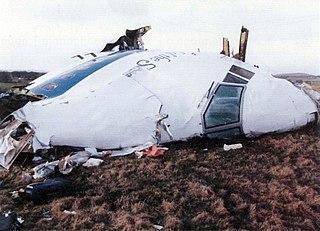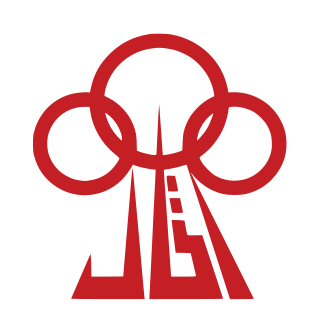| |||||
| Decades: | |||||
|---|---|---|---|---|---|
| See also: | Other events of 1994 List of years in Libya | ||||
The following lists events that happened in 1994 in Libya .
| |||||
| Decades: | |||||
|---|---|---|---|---|---|
| See also: | Other events of 1994 List of years in Libya | ||||
The following lists events that happened in 1994 in Libya .

Libya, officially the State of Libya, is a country in the Maghreb region of North Africa. It borders the Mediterranean Sea to the north, Egypt to the east, Sudan to the southeast, Chad to the south, Niger to the southwest, Algeria to the west, and Tunisia to the northwest, as well as maritime borders with Greece, Italy and Malta to the north. Libya comprises three historical regions: Tripolitania, Fezzan, and Cyrenaica. With an area of almost 1.8 million km2 (700,000 sq mi), it is the fourth-largest country in Africa and the Arab world, and the 16th-largest in the world. Libya claims 32,000 square kilometres of southeastern Algeria, south of the Libyan town of Ghat. The country's official religion is Islam, with 96.6% of the Libyan population being Sunni Muslims. The official language of Libya is Arabic, with vernacular Libyan Arabic being spoken most widely. The majority of Libya's population is Arab. The largest city and capital, Tripoli, is located in northwestern Libya and contains over a million of Libya's seven million people.

Tripoli is the capital and largest city of Libya, with a population of about 1.317 million people in 2021. It is located in the northwest of Libya on the edge of the desert, on a point of rocky land projecting into the Mediterranean Sea and forming a bay. It includes the port of Tripoli and the country's largest commercial and manufacturing center. It is also the site of the University of Tripoli.

Muammar Muhammad Abu Minyar al-Gaddafi was a Libyan revolutionary, politician and political theorist who ruled Libya from 1969 until his assassination by rebel forces in 2011. He came to power through a military coup, first becoming Revolutionary Chairman of the Libyan Arab Republic from 1969 to 1977 and then the 'Brotherly Leader' of the Great Socialist People's Libyan Arab Jamahiriya from 1977 to 2011. Initially ideologically committed to Arab nationalism and Nasserism, Gaddafi later ruled according to his own Third International Theory.

The Libyan Islamic Fighting Group (LIFG), also known as Al-Jama'a al-Islamiyyah al-Muqatilah bi-Libya, was an armed Islamist group. Militants participated in the 2011 Libyan Civil War as the Libyan Islamic Movement, and are involved in the Libyan Civil War as members of the Libya Shield Force. Alleged militants include alleged Al Qaeda organizer Abd al-Muhsin Al-Libi who now holds a key command position in the Libya Shield Force.

Saif al-Islam Muammar al-Gaddafi is a Libyan political figure. He is the second son of the late Libyan leader Muammar Gaddafi and his second wife Safia Farkash. He was a part of his father's inner circle, performing public relations and diplomatic roles on his behalf. He publicly turned down his father's offer of the country's second highest post and held no official government position. According to United States Department of State officials in Tripoli, during his father's reign, he was the second most widely recognized person in Libya, being at times the de facto prime minister, and was mentioned as a possible successor, though he rejected this. An arrest warrant was issued for him on 27 June 2011 by the International Criminal Court (ICC) for charges of crimes against humanity against the Libyan people, for killing and persecuting civilians, under Articles 7(1)(a) and 7(1)(h) of the Rome statute. He denied the charges.

Muammar Gaddafi became the de facto leader of Libya on 1 September 1969 after leading a group of young Libyan Army officers against King Idris I in a bloodless coup d'état. After the king had fled the country, the Revolutionary Command Council (RCC) headed by Gaddafi abolished the monarchy and the old constitution and established the Libyan Arab Republic, with the motto "freedom, socialism and unity". The name of Libya was changed several times during Gaddafi's tenure as leader. From 1969 to 1977, the name was the Libyan Arab Republic. In 1977, the name was changed to Socialist People's Libyan Arab Jamahiriya. Jamahiriya was a term coined by Gaddafi, usually translated as "state of the masses". The country was renamed again in 1986 as the Great Socialist People's Libyan Arab Jamahiriya, after the United States bombing that year.

Pan Am Flight 103 (PA103/PAA103) was a regularly scheduled Pan Am transatlantic flight from Frankfurt to Detroit via a stopover in London and another in New York City. The transatlantic leg of the route was operated by Clipper Maid of the Seas, a Boeing 747 registered N739PA. Shortly after 19:00 on 21 December 1988, while the aircraft was in flight over the Scottish town of Lockerbie, it was destroyed by a bomb, killing all 243 passengers and 16 crew in what became known as the Lockerbie bombing. Large sections of the aircraft crashed in a residential street in Lockerbie, killing 11 residents. With a total of 270 fatalities, it is the deadliest terrorist attack in the history of the United Kingdom.
Abdul Majid al-Qaʿud was a veteran Libyan politician under Muammar Gaddafi. He served as Mayor of Tripoli from 1971 to 1972, Minister of Agriculture from 1972 to 1976, Minister of Energy from 1978 to 1982, and General Secretary of the People's Committee from 29 January 1994 to 1 March 1997.
Abuzed Omar Dorda was a Libyan politician who was the General Secretary of the People's Committee of Libya from 7 October 1990 to 29 January 1994, and Libya's Permanent Representative to the United Nations from 1997 to 2003.

Al-Ittihad Sport, Cultural & Social Club famously known as 'Al-Ittihad, is a professional football club based in Bab Ben Gashier, Tripoli, Libya. They have won the Libyan Premier League 19 times, the Libyan Cup 7 times and the Libyan SuperCup 11 times. Al-ittihad reached the semi-finals of the CAF Confederation Cup in 2010.

The Libyan civil war, also known as the First Libyan Civil War, was an armed conflict in 2011 in the North African country of Libya that was fought between forces loyal to Colonel Muammar Gaddafi and rebel groups that were seeking to oust his government. The war was preceded by protests in Zawiya on 8 August 2009 and finally ignited by protests in Benghazi beginning on Tuesday 15 February 2011, which led to clashes with security forces who fired on the crowd. The protests escalated into a rebellion that spread across the country, with the forces opposing Gaddafi establishing an interim governing body, the National Transitional Council.

Abdul Fatah Younis Al-Obeidi was a senior Libyan military officer. He held the rank of major general and the post of minister of interior, but resigned on 22 February 2011 and defected to the rebel side in the First Libyan Civil War. He was considered a key supporter of Muammar Gaddafi or even No. 2 in the Libyan government.

The National Transitional Council (NTC) was a transitional government established in the 2011 Libyan civil war. The rebel forces overthrew the Libyan Arab Jamahiriya of Muammar Gaddafi. The NTC governed Libya for a period of ten months after the end of the war, holding elections to a General National Congress on 7 July 2012, and handing power to the newly elected assembly on 8 August.

The Libyan National Army or the Libyan Arab Army is a component of Libya's military forces which were nominally a unified national force under the command of Field Marshal Khalifa Haftar when he was nominated to the role on 2 March 2015 by the House of Representatives, consisting at the time of a ground force, an air force and a navy.

The 2012 Benghazi attack was a coordinated attack against two United States government facilities in Benghazi, Libya, by members of the Islamic militant group Ansar al-Sharia. On September 11, 2012, at 9:40 p.m. local time, members of Ansar al-Sharia attacked the American diplomatic compound in Benghazi resulting in the deaths of both United States Ambassador to Libya J. Christopher Stevens and U.S. Foreign Service Information Management Officer Sean Smith. At around 4:00 a.m. on September 12, the group launched a mortar attack against a CIA annex approximately one mile (1.6 km) away, killing two CIA contractors Tyrone S. Woods and Glen Doherty and wounding ten others. Initial analysis by the CIA, repeated by top government officials, indicated that the attack spontaneously arose from a protest. Subsequent investigations showed that the attack was premeditated—although rioters and looters not originally part of the group may have joined in after the attacks began.

The Libyan civil war (2014–2020), also known as the Second Libyan Civil War, was a multilateral civil war which was fought in Libya among a number of armed groups, but mainly the House of Representatives (HoR) and the Government of National Accord (GNA), for six years from 2014 to 2020.

In October 2014, the self-declared Islamic State of Iraq and the Levant (ISIL) took control of numerous government buildings, security vehicles and local landmarks in the Eastern Libyan coastal city of Derna. Although some media outlets reported the control as being absolute, rival groups like the al-Qaeda-affiliated Abu Salim Martyrs Brigade continued to control parts of the city. Clashes erupted between ISIL and an alliance of Islamist groups in June 2015, with ISIL retreating from Derna to outlying suburbs the following month. However, clashes continued between the Islamist alliance and the Tobruk-based government forces.

The Islamic State – Libya Province is a militant Islamist group active in Libya under three branches: Fezzan Province in the desert south, Cyrenaica Province in the east, and Tripolitania Province in the west. The branches were formed on 13 November 2014, following pledges of allegiance to IS leader Abu Bakr al-Baghdadi by militants in Libya.

Wissam Najm Abd Zayd al-Zubaydi, better known by his noms de guerre Abu Nabil al-Anbari, Abul Mughirah al-Qahtani or Abu Yazan al-Humairi was a commander in the Islamic State of Iraq and the Levant (ISIL) and the leader of its Libyan branch. Al-Anbari was killed by a US military airstrike on 13 November 2015.

The Western Libya campaign was a military campaign initiated on 4 April 2019 by the Operation Flood of Dignity of the Libyan National Army, which represents the Libyan House of Representatives, to capture the western region of Libya and eventually the capital Tripoli held by the United Nations Security Council-recognised Government of National Accord. The Government of National Accord regained control over all of Tripoli in June 2020 and the LNA forces withdrew from the capital, after fourteen months of fighting.